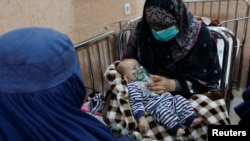The World Health Organization has warned that a lack of funding and resources to support Afghanistan's health care system threatens millions of lives in a country ravaged by decades of instability and natural disasters.
Through its new alert launched Friday, the WHO urged the global community to help address the Afghan health crisis, saying "the consequences of inaction are catastrophic."
The WHO noted that unless investment is ramped up, 8 million Afghans will lose access to essential and potentially lifesaving health assistance, and 450,000 patients will have little to no access to lifesaving trauma care services.
Additionally, an estimated 1.6 million people with mental health conditions will have little to no access to mental health consultation and psychosocial support.
"The situation in Afghanistan is grave, and the lack of resources and funding to support health workers and facilities is putting countless lives at risk," said WHO Director-General Tedros Adhanom Ghebreyesus.
"Women and children are suffering the most. I call on donors to give generously so that we can continue our lifesaving work," he urged.
The U.N. has appealed for $3.26 billion in humanitarian funding for Afghanistan this year but donors have given only about $800 million — less than 25% of the appeal — as of August 8. More than two-thirds of the country's estimated 40 million population need urgent assistance.
"The vulnerability of women and girls has further intensified, as they face increased obstacles in accessing healthcare due to the ban on education and workforce participation," the WHO noted Friday.
The hardline Taliban government, the Islamic Emirate of Afghanistan, or IEA, has imposed sweeping restrictions on women's access to work and education since retaking control in August of 2021. It has also banned Afghan female staff of the United Nations and other aid groups from workplaces, undermining humanitarian operations nationwide.
ICRC program
Meanwhile, the Geneva-based International Committee of the Red Cross, or ICRC, is preparing to cease funding for more than 25 Afghan public hospitals by the end of August, citing worldwide funding difficulties.
The support, called the Hospital Resilience Program, was launched to respond to health care needs following the Taliban takeover, Cecilia Goin, the ICRC communication coordinator for the Afghan mission, told VOA.
She said when the ICRC introduced the program, the Afghan health care system almost had come to a "full stop" due to the lack of financial resources and significant administrative changes.
"It was an exceptional emergency measure taken by the organization to save the health care system from collapsing due to the financial crises that Afghanistan was experiencing at the time and because many development agencies and other organizations left the country, while the ICRC stayed," Goin explained.
The program's main goal was to allow Taliban authorities to organize themselves to take over their duties, Goin said.
"This support was never designed to last in time and it will come to an end. The financial difficulties the ICRC is facing worldwide have sped up, in transparency with IEA authorities, the expected return of the full responsibilities of the health services to the Ministry of Public Health," she said.
Goin vowed that the ICRC would monitor the situation, however, and she underscored that its health assistance to Afghanistan will continue to support critical programs. That includes rehabilitation support for people with disabilities and more than 46 primary health care clinics run by the Afghan Red Crescent Society, facilitating access to health care for 1 million people.





